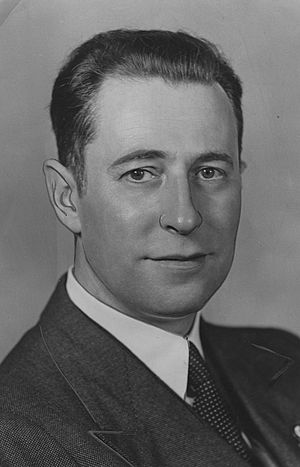Hans Fritzsche facts for kids
Quick facts for kids
Hans Fritzsche
|
|
|---|---|

Fritzsche in 1940
|
|
| Personal details | |
| Born | 21 April 1900 Bochum, German Empire |
| Died | 27 September 1953 (aged 53) Cologne, West Germany |
| Nationality | German |
| Political party | National Socialist German Workers' Party (NSDAP) |
| Spouse | Hildegard Fritzsche |
| Occupation | Ministerialdirektor in the Ministry for Popular Enlightenment and Propaganda |
| Profession | Journalist, Government Official |
Hans Fritzsche (born April 21, 1900 – died September 27, 1953) was a very important person in the Propaganda Ministry of Nazi Germany. He was known as the top German radio broadcaster of his time. His job was to make the Nazi government seem more popular and fun. Most Germans recognized his voice.
Fritzsche was in Adolf Hitler's secret underground bunker in Berlin during the very last days of World War II. After Hitler died, Fritzsche went to the Soviet soldiers in Berlin on May 1, 1945. He offered to surrender the city to the Red Army. He was then taken as a prisoner.
Contents
Hans Fritzsche's Early Life and Career
Hans Fritzsche was born in Bochum, a city in the Ruhr area of Germany. His father was a postal worker. In 1917, when he was 17, he joined the German Army as a private soldier and fought in Flanders during World War I.
After the war, he studied at universities but did not finish his degree. In 1923, he became a journalist for the Hugenberg Press. This company shared nationalistic ideas, similar to those of the Nazis. In September 1932, he started his career in radio. He became the head of the Wireless News service, which was a government agency. He began his own daily radio show called "Hans Fritzsche speaks."
In 1929 or May 1933, he joined the Nazi Party. He also became a member of the Sturmabteilung (SA), which was a Nazi paramilitary group. He was also part of the Academy for German Law.
Role in the Propaganda Ministry
On May 1, 1933, the Wireless News service became part of Joseph Goebbels' Propaganda Ministry. In 1938, Fritzsche became the head of the Press Division within this ministry. Later, in November 1942, he became the head of the Radio Division.
Fritzsche did not create the main policies for the Nazi government. However, during World War II, he was Germany's most famous radio commentator. He used his broadcasts to share the government's messages.
The Final Days in Berlin
In April 1945, during the Battle of Berlin, Hans Fritzsche was in the Führerbunker in Berlin. This was Adolf Hitler and Goebbels' underground shelter during the last days of the war.
On May 1, Goebbels, who was briefly the new leader after Hitler, tried to arrange a temporary ceasefire with the Soviet Army. He sent German General Hans Krebs to deliver a letter to Soviet General Vasily Chuikov. Chuikov commanded the Soviet forces in central Berlin. When the Soviets refused the ceasefire, Goebbels felt that further efforts were useless.
Fritzsche then decided to act on his own. He went to his office nearby and wrote a letter of surrender addressed to Soviet Marshall Georgy Zhukov. Another general, Burgdorf, found Fritzsche and asked if he planned to surrender Berlin. Fritzsche confirmed he was going to do so. Burgdorf became angry, saying Hitler had forbidden surrender and that Fritzsche, as a civilian, had no right to do it. Burgdorf tried to shoot Fritzsche, but a radio technician stopped him. Fritzsche then left his office and went to the Soviet lines to offer the surrender of the city.
After the War: Trial and Release
Soviet Red Army soldiers took Fritzsche as a prisoner. He was sent to Moscow for questioning. He was held in difficult conditions. He eventually signed a confession. Later, he wrote about his time in Soviet prison while he was on trial in Nuremberg.
Fritzsche was sent to Nuremberg to be tried by the International Military Tribunal. He was accused of being part of a plan to commit crimes against peace and other serious offenses. The court looked at his role in the Nazi propaganda system.
Many people, including journalist William L. Shirer, were unsure why Fritzsche was on trial. They thought he was not important enough to be there, perhaps serving as a stand-in for Goebbels, who had died. The prosecutors claimed he "encouraged serious actions by purposely changing news to make Germans feel strong emotions." However, the court found him not guilty. They said his broadcasts were not meant to make Germans commit terrible acts against people in conquered lands. He was one of only three people found not guilty at Nuremberg.
Later, a prosecutor named Alexander Hardy said that new evidence, not available during the trial, showed Fritzsche knew about the killing of European Jews and played a part in it. This new evidence would have led to his conviction.
After the Nuremberg trial, a German court reviewed Fritzsche's case. This court classified him as a "Major Offender" and gave him a sentence of nine years of hard labor. He was pardoned in September 1950. He married his second wife, Hildegard Springer, in 1950. Hans Fritzsche died of cancer in 1953. His wife died the same year.
Fritzsche, along with Albert Speer and Baldur von Schirach, received the Eucharist from Lutheran Pastor Henry F. Gerecke while imprisoned.
See also
 In Spanish: Hans Fritzsche para niños
In Spanish: Hans Fritzsche para niños
- Downfall, a 2004 German film where actor Michael Brandner played Hans Fritzsche.
- Reich Ministry of Public Enlightenment and Propaganda

